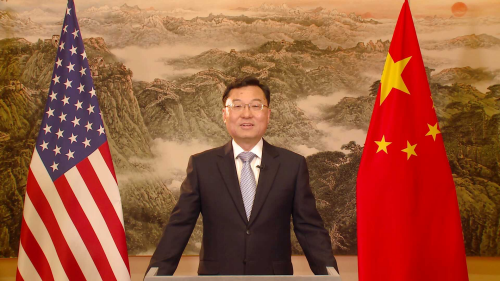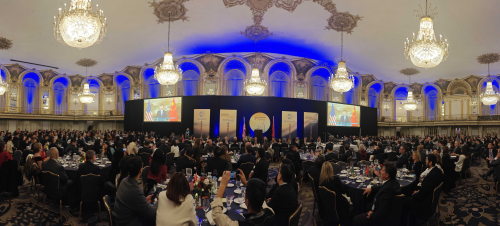
The People’s Republic of China



Chairman Ni Pin,Chairman Hu Wei,
The Honorable Vice President Mike Pence,
Ambassador Gary Locke,
Ambassador Max Baucus,
Ambassador Terry Branstad,
Senators, congressmen and congresswomen,
Governors and mayors,
Ladies and gentlemen,
Dear friends,
Good evening! It is a great pleasure to join you in the Windy City via video link, to explore together how to navigate the China-U.S. relationship steadily forward in this turbulent world and amid the headwinds against the global economy.
As our two countries mark the 45th anniversary of our diplomatic relations and the U.S. presidential election has come to an end, the China-U.S. relationship is again at a new historical starting point. The theme of CGCC Chicago’s annual gala this year, “Charting New Horizons”, cannot be more relevant. It reflects the resolve of people with vision from both countries to seek new opportunities, and a sense of responsibility to strive for new achievements.
We need to assume a new vision for the China-U.S. relationship. As two major countries, China and the United States should only get their relationship right, not mess it up. From the ice breaking to the establishment of diplomatic relations and to the exploration of a right way to get along today, generations of people in both our countries have put in strenuous efforts and achieved historic progress. What we need to do is to carry it forward and keep adding building blocks to the mansion of the China-U.S. relationship.
Not long ago, our Presidents had a successful meeting in Lima. Taking stock of the experience and inspirations from the past 45 years of China-U.S. diplomatic ties, President Xi Jinping observed that when our two countries treat each other as partner and seek common ground while shelving differences, our relationship will make considerable progress. But if we regard each other as rival and engage in vicious competition, we will roil the relationship or even set it back.
History has proven that China and the United States stand to gain from cooperation and lose from confrontation. A new Cold War should not be fought and cannot be won. Containing China is unwise and bound to fail. Which should one choose, to be friends with 1.4 billion people, or to turn against each other? The answer is self-evident.
At this new crossroads, we cannot backpedal or take one step forward but then two backward. Instead, we need to forge ahead step by step, uphold the principles of mutual respect, peaceful coexistence and win-win cooperation, enhance dialogue and communication, properly manage differences and expand mutually beneficial cooperation, so as to find a right way for our two countries to get along in the new era.
We need to break new ground in the development of China-U.S. relations. As Confucius said, “To establish oneself, one must also help others establish themselves; to succeed, one must also help others succeed.” Both China and the United States are great countries. We should focus on managing our own affairs well, and also complement each other and help one another succeed.
During the historical process of reform and opening-up, China and the world have progressed together. China is committed to developing itself by keeping its door open. As the largest trader in goods for seven years in a row, it has become a key hub in global industrial and supply chains. Whoever tries to isolate China would end up isolating themselves.
Currently, the Chinese economy has kept making steady progress. With its GDP in the first three quarters growing 4.8% year-over-year, China continues to rank among the top in major economies. Also, both the green industries and the investment in high-tech industries have continued to grow in double digits. On the whole, we have achieved reasonable growth while optimizing the economic structure, shifting toward new engines and improving the quality of development.
As the latest package of incremental policies are paying off, China’s key economic indicators involving market sales, the service sector and foreign trade showed a significant rebound in October, and positive factors are building up. The Chinese economy continues to enjoy strong resilience, vast potential, great vitality and broad room. We have every confidence that we will maintain long-term growth, achieve high-quality development, and defuse external challenges.
We also need to expand new space for China-U.S. cooperation. The interests of our two countries are deeply intertwined. The Chinese market accounts for two-thirds of Qualcomm’s global revenue, and one-fourth of Intel’s. About 80% of Apple’s 200 major suppliers manufacture in China. Chinese members of the CGCC have invested over 144 billion US dollars in the United States, creating more than 230,000 jobs directly. As some American friends vividly put it, decoupling from China would be “shooting oneself in the foot”, and a trade war has become a “sword of Damocles” looming over American businesses.
Weaponizing tariffs is no panacea, and could easily cause a tit-for-tat vicious cycle. Instead of bringing the overall trade deficit down, it would only drive production costs up, increase the burden on the people, heighten inflationary pressures, and widen the wealth gap. 98% of economists believe that higher tariffs will ultimately be paid by American consumers, and international institutions like Moody’s have warned a tariff war would backfire at the U.S. economy.
There are voices advocating revoking China’s permanent normal trade relations status. The truth is, the PNTR status is not a unilateral favor from the United States, but an obligation of all WTO members. Any attempt to end it would be trampling upon international economic and trade rules and rattling the very foundation of the global trading system.
In the new era, China and the United States have only more, not fewer, common interests. From areas like economy, trade, agriculture, counternarcotics, law enforcement and public health, to global challenges such as climate change and AI as well as international hotspot issues, China-U.S. cooperation is crucial. Mutual benefit is the most beautiful vocabulary in China’s dictionary, and win-win cooperation is the best choice for our two countries.
Dear friends,
As President Xi Jinping pointed out, “China-U.S. relations should always advance the well-being of the two peoples and bring them closer together.” The business communities in both countries are never outsiders in this relationship, but a staunch force for China-U.S. cooperation. The American Midwest has always been a fertile ground for our economic cooperation. Chinese investors like Wanxiang Group and Fuyao Group have been committed to the region over the years, writing stories of win-win cooperation.
It is my hope that you will actively speak up to defend your rights and interests, make every effort to deepen mutually beneficial cooperation, and strive to promote the well-being of our two peoples. I encourage you to continue leveraging the role of economic cooperation as the anchor and the stabilizer, inject fresh momentum into China-U.S. relations, and chart new horizons.
Thank you very much.



